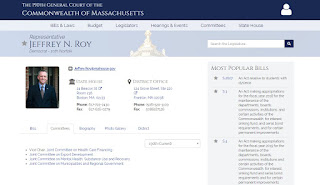“Representative Roy is an innovative and thoughtful legislator with demonstrated, in-depth knowledge of both healthcare and the law. We’re proud that he was named to this commission as he will bring value to its work,” said Speaker DeLeo. “He has been a steadfast supporter of the recovery community and has focused on combatting the opioid crisis and improving our healthcare system to best meet the needs of patients. We appreciate his dedication and service to our Commonwealth.”
"I am excited to join the commission and continue working toward the goal of helping those with substance use disorders find a pathway to recovery,” said Representative Roy. "The findings from the commission’s report will be important in addressing this issue at the local and state level and will provide meaningful opportunities for our residents who are struggling with addiction."
“The harm reduction commission will take a closer look at how to engage people at all stages of substance use disorder and encourage recovery,” said State Representative Denise C. Garlick (D-Needham), Chair of the Joint Committee on Mental Health, Substance Use and Recovery. "Representative Roy is a member of the Joint Committee on Mental Health, Substance Use and Recovery and has been a dedicated, compassionate advocate for his district and a leader with experience and insight through the enactment of the opioid bill. Representative Roy is committed to helping individuals who are suffering, families who are struggling and communities straining to meet the many needs of people of all ages dealing with the issues of addiction. I believe his perspective will be invaluable to the people of his district and to the Commission’s work.”
The commission consists of 15 members, including the secretary of health and human services; the commissioner of public health; house and senate members of the joint committee on mental health, substance use and recovery or their designees; the mayor of the city of Boston or a designee; the mayor of the city of Cambridge or a designee; and representatives from the Massachusetts Medical Society, the Massachusetts Health and Hospital Association, and the Massachusetts Chiefs of Police Association. It also includes persons with a substance use disorder, a clinician with experience in mental health and substance use disorder, a person working in an established harm reduction program, an expert in relevant state and federal law and regulation, and a representative of local municipal boards of health.
In its work, the Commission will consider:
- the feasibility of operating harm reduction sites in which (A) a person with a substance use disorder may consume pre-obtained controlled substances, (B) medical assistance by health care professionals is made immediately available to a person with a substance use disorder as necessary to prevent fatal overdose, and (C) counseling, referrals to treatment and other appropriate services are available on a voluntary basis;
- the potential public health and public safety benefits and risks of harm reduction sites;
- the potential federal, state and local legal issues involved with establishing harm reduction sites;
- appropriate guidance that would be necessary and required for professional licensure boards and any necessary changes to the regulations of such boards;
- existing harm reduction efforts in the commonwealth and whether there is potential for collaboration with existing public health harm reduction organizations;
- opportunities to maximize public health benefits, including educating persons utilizing the sites of the risks of contracting HIV and viral hepatitis and on proper disposal of hypodermic needles and syringes;
- ways to support persons utilizing the sites who express an interest in seeking substance use disorder treatment, including providing information on evidence-based treatment options and direct referral to treatment providers;
- other harm reduction opportunities, including but not limited to, broadening the availability of narcotic testing products, including fentanyl test strips;
- alternatives and recommendations to broaden the availability of naloxone without prescription; and
- other matters deemed appropriate by the commission.
The Commission will also review the experiences and results of other states and countries that have established supervised drug consumption sites and other harm reduction strategies and report on the impact of those harm reduction sites and strategies.
The Commission’s first meeting is scheduled for October 24, 2018 and its findings and recommendations are due to the legislature by February 1st, 2019.
Please contact the office of Representative Roy with any questions or concerns at (617) 722-2430 or Jeff.roy@mahouse.gov.
 |
| Representative Roy Named to Harm Reduction Commission |









